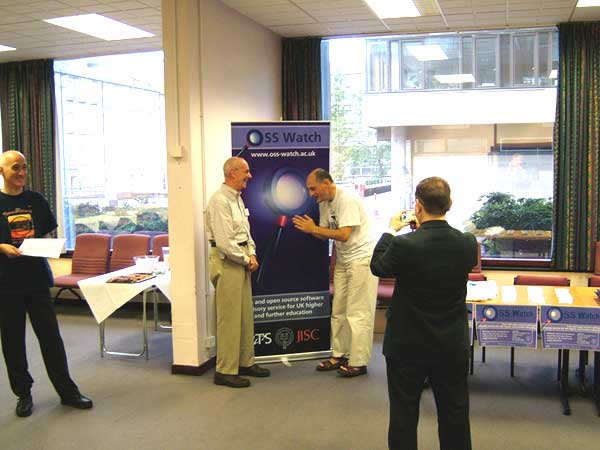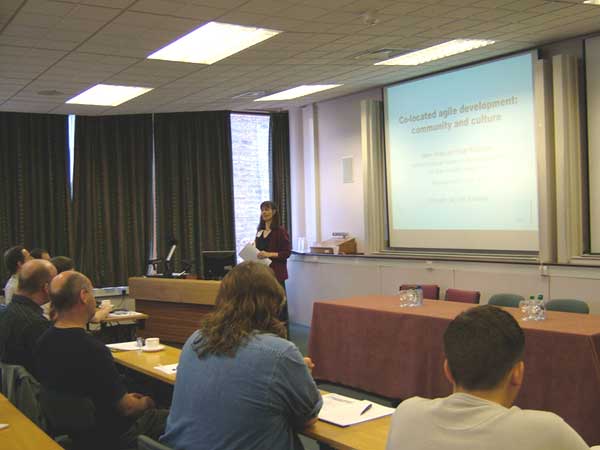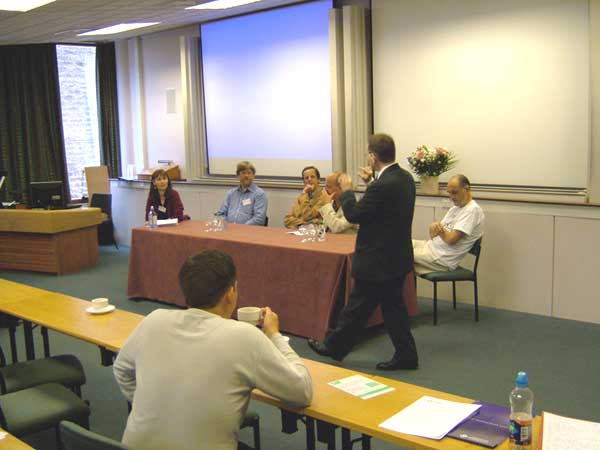Building Open Source Communities: 4th OSS Watch Conference
When people get together and talk about open source, there are three things that come into the conversation early on. Firstly, they argue about open source licences; secondly, they ask "but is it really free?"; and thirdly, they state that "it's all about the community". That last one is definitely worth unpacking further.
When a new project starts, or an existing project is being assessed, everyone will ask "what sort of community does it have?" Moreover, it might be thought that community is something for which you can find a recipe. This is just the sort of question the 4th OSS Watch [1] national conference, Building Open Source Communities, set out to answer on 4 July in Edinburgh.
You may remember July 4th. That was a day or so after Live8, and 2 days before the G8 summit. Unfortunately, Bob Geldof and Tony Blair had not consulted OSS Watch about their events. We were, therefore, a little apprehensive about attracting people up to Edinburgh for the event, but in the end we had a very lively gathering of people to listen to a varied day of talks at the University of Edinburgh.
Bill Olivier, JISC Development Director (Systems and Technology), opened the conference, speaking about JISC's interest in the open source phenomenon. He took the opportunity to start the process of publicising JISC's soon-to-be published open source policy, which was approved by JISC committees earlier this year. Amongst other matters, the policy discusses the importance of sustainable communities.
The OSS Watch manager, Sebastian Rahtz, started the discussion of communities by trying to break down the ways in which open source users and developers group themselves together [2]. A community of developers is not the same as a community of users; furthermore, the open source method may simply be a way for programmers to work together efficiently. He enumerated some of the roles people may take within a community (leader, project manager, programmer, documenter, disseminator, enthusiast, etc), and offered the well-known projects of Apache, Firefox, Moodle, Debian [3] and uPortal as successful examples of different approaches. He stressed the importance of understanding the type of community one wants to build, instead of blindly copying the working methods of Apache and expecting to have similar recognition.

Sebastian Rahtz thanks Jim Farmer for agreeing to speak at Building Open Source Communities
Jim Farmer, a familiar and welcome face from the uPortal and Sakai [4] projects, took the subject of communities wider [5], and placed open source in the context of traditional commercial software vendors. As these companies, he argued, take open source ever more seriously, so discussions about licensing and the various open source business models become more than academic. The idealistic notions of free software, perhaps associated with the GPL licence, face many challenges as open source is embedded into corporate business plans.
After coffee, Helen Sharp, from The Open University Computer Science Department and the Centre for Empirical Studies of Software Development, took us on a very different journey [6] into the world of Extreme Programming (XP) [7], and Agile [8] development in general. Since open source enthusiasts have made much of the importance of Eric Raymond's "bazaar" style of development [9], we wanted to hear whether Agile is the same thing under another name, or relevant solely in a closed source environment. Dr Sharp has studied XP in practice in software companies, and described the basics of the methodology with reference to a set of real-life scenarios. The talk inevitably left a lot of questions unanswered, but the relevance to the methodologies in informal use in open source groups was obvious. The oft-expressed mantra of "release early, release often" was put into context by showing how it fits into XP's quite formal structure.

Helen Sharp from The Open University talks about co-located agile development
Gustav Delius, from the University of York Mathematics Department, brought us back to the type of JISC community with which most of the audience were probably familiar [10]. He leads the successful Serving Maths Project, which has developed ways of embedding maths-related teaching exercises in a variety of VLE programs. Gustav represented here a community neither of users nor developers, but of practitioners, maths teachers who wanted a working tool. This was an important new viewpoint, though in practice Gustav turned out to be yet another admirer of Moodle [11], a theme which continued through the day.
After lunch, the meeting focused even more on the workings of real projects. Andrew Savory, Director of Luminas [12] and a Cocoon committer, took us on a detailed tour [13] of the Apache [14] Project, describing the decision-making processes, the legal structure, and the history. Two points came over clearly. Firstly, Apache is based on a hierarchical technical meritocracy, in which developers come in at the bottom, prove themselves, then rise up a series of ranks to the top-level committee. Secondly, Apache's formal status dates from when IBM and HP donated substantial amounts of code, and needed crystal clear agreements on copyright and future directions.
Finally, Sean Keogh talked [15] about the grass-roots MoodleMoot [16] meetings which he started in 2004. As became clear throughout the day, Moodle has a very well developed and coherent community, not least because it attracts people more interested in teaching than in IT. The MoodleMoot in 2004 was the first face-to-face meeting of users, and was rapidly followed by others around the world. It shows how important meeting in person can be. Sean is a UK Moodle Partner; this is another interesting development, in which those offering regular Moodle consultancy can gain a special status and in return tithe a proportion of their income back to the project.
A final panel session opened up a broad range of questions from the delegates and some thought-provoking answers.

Panel discussion session at the end of the day
The OSS Watch communities conference took a broad approach to the subject, from moots to XP. It did not attempt to offer participants a top ten steps they could take to guarantee a great community, or to identify infallible rules for sustainability. The belief that the success of open source is dependent on communities remained true, but we were reminded of just how wide a range of activities community can describe.
References
- OSS Watch - open source software advisory service http://www.oss-watch.ac.uk/
- What is an open source software community?, Sebastian Rahtz, July 2005 http://www.oss-watch.ac.uk/events/2005-07-04/index.pdf
- Debian - The Universal Free Operating System http://www.debian.org/
- The Sakai Project http://www.sakaiproject.org/
- Licenses, Features and the Open Source Community in Higher Education, Jim Farmer, 4 July 2005 presentation http://www.oss-watch.ac.uk/events/2005-07-04/I050704F_OSS_Watch.pdf
- Co-located agile development: community and culture, Helen Sharp and Hugh Robinson, July 2005, presentation http://www.oss-watch.ac.uk/events/2005-07-04/extreme.pdf
- Extreme Programming:A Gentle Introduction http://www.extremeprogramming.org/
- Manifesto for Agile Software Development http://agilemanifesto.org/
- The Cathedral and the Bazaar http://www.catb.org/~esr/writings/cathedral-bazaar/
- Serving Maths: Experiences from a JISC Distributed e-Learning Project, Gustav Delius, July 2005, presentation http://www.oss-watch.ac.uk/events/2005-07-04/servingmaths.pdf
- Moodle - A Free, Open Source Course Management System for Online Learning http://moodle.org/
- Luminas Internet Applications http://www.luminas.co.uk/
- Life and times in the Apache community, Andrew Savory, July 2005, presentation http://www.oss-watch.ac.uk/events/2005-07-04/community.pdf
- The Apache Software Foundation http://www.apache.org/
- Meeting Real People Meeting Real People from a Virtual Community from a Virtual Community, Sean Keogh, July 2005, presentation http://www.oss-watch.ac.uk/events/2005-07-04/moodlemoot_presentation4b.pdf
- MoodleMoot Home Page http://moodlemoot.org/
